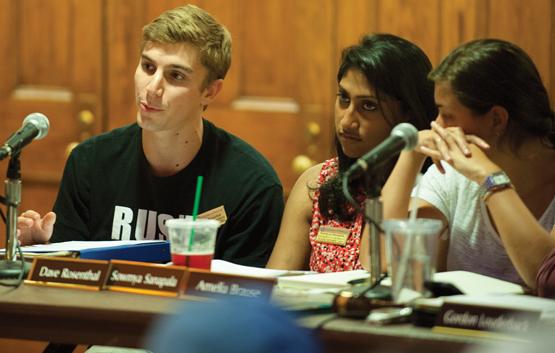New website links students buying, selling books

October 30, 2013
Students will no longer need to haggle with the employees of book buy-back carts or attempt to purchase and sell books through social media.
Using Textbook Friend, an online platform where students can buy and sell textbooks to other students at their campus, students can browse for books on a platform for only Pitt students that organizes books by schools, majors and course numbers.
The website’s services became available to Pitt students about a week ago. The Student Government Board voted Tuesday to support Textbook Friend during the public meeting, which about 40 students attended, at Nordy’s Place in the William Pitt Union.
Board member Sarah Winston and Nuwan Perera, chair of SGB’s Academics Affair Committee, started working with Karan Parekh and Joshua Haghani, the site’s co-founders, about three weeks ago to establish an individual platform on the website for Pitt students. The website charges no fee for service and serves about 2,500 students at 39 universities nationwide.
Parekh and Haghani, who are now sophomores at the University of Pennsylvania, founded Textbook Friend last October. Parekh said they wanted to develop a system that would empower students rather than big business.
“There are large players like Amazon, Ebay and Chegg, where students can find cheaper textbooks, but [the companies] also take a very big part of the sale,” Parekh said.
Last SGB election season, Winston campaigned to establish a textbook exchange for Pitt students. She and Perera began working with Deborah Fyock, manager of the University Store on Fifth Avenue, in January to come up with a plan for the exchange.
Winston said that she and Perera met with Fyock three or four times last semester, but have not met again since April.
According to Winston, Fyock did not give her a definitive answer about the proposal for a textbook swap. She added that she and Perera have not been able to meet with Fyock this semester.
“I’m still going to work with Deborah, but I think this is a good starting point to show her how students really are interested,” Winston said.
Fyock said in an email that she was happy to work with Winston and Perera to find a way to reduce textbook costs.
She said that, at the time, the University was working to develop an online textbook price comparison program, but she could only hint to Winston and Perera about the program because it was not released until August.
Students can use the program to compare the prices of books at the University Store with prices from online textbook distributors, according to Fyock’s statement.
If a student buys a book from a competitor’s site through the program, she said, the bookstore makes no money on the sale. Fyock said the University store intended the comparison program to operate as part of a “one-stop shopping experience” for students.
“Students are encouraged to use the swap if they want as yet another means to buy books,” Fyock said.
Fyock did not answer additional questions through email asking the number of textbooks sold by the University’s bookstore and the University’s total profit from booksales.
On the Textbook Friend website, students can select their university, academic school and major. Then, they can begin browsing an array of textbooks. If they find a book they want to purchase, they can contact the seller and arrange a time and place to meet on campus to complete the transaction.
Students looking to sell a book can list details including the title, edition, author, subject, course name and number and, finally, price.
According to Parekh and Haghani, it cost about $3,500 to create the website. They funded the project with their own money and incurred a small loss, which they hope to compensate for through digital advertisements in the future.
“We see ourselves more as a communication tool where students can meet up with other students,” Parekh said. “We don’t watch them or take a cut [of the money].”
Winston referred to Textbook Friend as “a community-building tool” and said it will allow for discussion between students about courses.
“Let’s say you want to take Anthropology of Food next semester, and I have just taken the class,” Winston said. “Not only would I be able to sell you the book, but I can tell you, ‘Oh, the midterm was really easy,’ and give you some tips and tricks for the class.”
Textbook Friend users must register for an account with their University email addresses for their own protection.
“[Students] had issues at Penn when they tried to do a transaction through Facebook and then they were meeting someone who wasn’t a student and potentially posed a threat,” Parekh said.
Parekh and Haghani work on the site with a team of 10 to 12 college students from the Philadelphia area. None of the students are paid, including Parekh and Haghani, except three or four students who work as computer programmers. The company is looking to hire more programmers, and Parekh said he would be interested in hiring Pitt students.
Parekh said there are also about 100 unpaid student marketers promoting the website across the nation on college campuses where the service is available. He said they have receivedt offers from firms that invest in start-up businesses, but he and Haghani did not want to give up any equity or ownership this early.
“The major goal is not to become millionaires off this project, but to help students and make sure they know it’s made for them and not to make a extra buck for someone else,” Parekh said.
In other action:
The Board voted to purchase a portable photo booth from Strike A Pose Photography for $8,222.
President Gordon Louderback said the Board thinks the photo booth is a way give back to student groups, who will be able to rent it for events.
Board member Amelia Brause said the Board estimates it will have the booth by December, and it will be available for students by the beginning of next semester.
Louderback congratulated Mona Kazour, Community Outreach chair, for the record number of PMADD volunteers and work sites last Saturday.
Louderback said he met with Dwight Helfrich, a manager at Computing Services and Systems Development, about the pros and cons of Google Apps for Education. Louderback said he is organizing another meeting with Kathy Humphrey, vice provost and dean of students, and Jinx Walton, chief information officer for CSSD, to discuss Humphrey’s and Walton’s progress on a decision over adopting a new webmail platform.
Board member C.J. Bonge and Abigail Zurschmit, Transportation Safety Committee chair, have postponed their safety seminar because of problems with one of the presenters.
Board member Amelia Brause said she is planning four events to increase Pitt’s scores on the Princeton Review Survey. Brause said she is also working with Perera on several academic initiatives, including working with the University to utilize Schedulizer, a website that allows students to see all of his or her possible course schedule options.
Board member John Cordier said the Zulema Fire Relief Fund gift cards will go out to the victims of the fire today. Cordier also said additional interactive boards will soon be put up in the William Pitt Union.
Board member Mike Nites said his meeting about the academic calendar was canceled last week and rescheduled for today. Nites said he and Lauren Barney, a junior Chinese and political science major, are researching the accreditation process through the business school to see how it affects final exam schedules.
Board member David Rosenthal urged students to complete an online survey about Panther Prints, the University’s yearbook. The Board is attempting to gauge student interest in the yearbook to see if the roughly $40,000 it takes to produce the yearbook should go toward other ventures.
Rosenthal said he met with a representative from The New York Times to consider topics for a presentation on campus. Some of the topics include the anniversary of Arab Spring, the conflict in Syria, labor rights and the government shutdown.
Board member Sowmya Sanapala said she is continuing to work with Pitt LGBT Outreach Alliance to survey how much the student body knows about sexual health.
Keep It Real appealed a budget request for $6,892.34 for vehicle rentals and a budget request for $508.30 for gas compensation. The Board voted to approve the requests in full.







